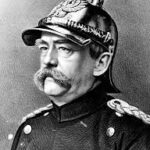In my experience, the morning’s journey to a battlefield is a solitary and solemn occasion. It should be taken in quiet contemplation of the possibilities of the day ahead before they were obscured by a prayer. For a Prussian Chancellor, the journey was a public and social event taken in a heavy ceremonial open carriage with room for a messenger in front and two uniformed and

feathered postillions mounted on the nigh horses. Baron von Bismarck and I sat in the rear facing forward and Count Bismarck-Bohlen, the Chancellor’s aide-de-camp and Dr Busch sat opposite. The two soldiers wore blue six-button tunics with gold piping, riding boots and those uncomfortable-looking spike
d helmets they called pickelhaube. Dr Busch, being a civilian, was allowed to wear his finest white suit which would make him the equal easiest for the enemy to spot.
It was a downright unmanly way to go to war, I thought.
Baron Bismarck’s conversation revolved around what the new world thought about Prussia. ‘I visited the Universal Exhibition in Paris just three
years ago,’ he told me. ‘One evening I attended the Opera where La Grande-Duchesse de Gérolstein was playing. It’s an opéra bouffe written by a joke German-born fiddle-player about joke German Princes and Generals, in a joke German principality. Its Chancellor, Baron Puck, embarked upon a war because he needed to create a diversion to get what he was after. I forget wha
t that was. I looked around the theatre and the audience, including the French Emperor and the Tsar were falling off their seats laughing at the whole thing.’
He stopped and looked over to see if I was following him. ‘That’s how we Prussians were seen for many years. Around the time I was born, ther
e w
ere 300 political German speaking entities and Gérolstein wasn’t one of them. Still isn’t! But here we are, one army with one purpose. I am no Baron Puck and this’, waving his hand at the columns of men we passed ‘is no diversion’.
Lieutenant General Philip Sheridan
United States Army,
Official war observer
